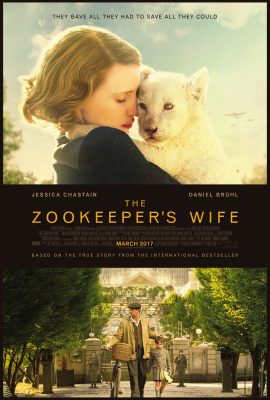“The Zookeeper’s Wife” Falls Flat
March 30, 2017

Rousing historical dramas don’t usually come to theaters this early in the year. They tend to grab November releases in order to garner attention as awards season begins. So why is “The Zookeeper’s Wife” being released in March? Upon seeing the film, the reason becomes clear: despite good intentions and a noble attempt from lead Jessica Chastain, “The Zookeeper’s Wife” is a so-so period drama, beset by a run-of-the-mill plot, weak dialogue and phoned-in efforts from the cast and crew.
In 1939 Poland, Antonina Żabiński (Jessica Chastain, “Zero Dark Thirty”) leads an idyllic life at the Warsaw Zoo, which she runs with her husband, Jan (played by Belgian actor Johan Heldenbergh). Their lives are soon interrupted, however, when Nazi forces invade Poland, and a force of German soldiers seize the zoo. Their leader is Herr Lutz Heck (Daniel Brühl, “Inglourious Basterds”), Hitler’s lead zoologist who has become smitten with Antonina, and wants to use the zoo grounds as a farm to provide Nazi soldiers with meat. Afraid for the lives of their Jewish friends, yet defiant in the face of the Nazi threat, Antonina and Jan resolve to smuggle Jews out of the ghetto in Warsaw, hide them in the zoo’s underground cages and sneak them out of the city to safety.
It’s an incredible true story, adapted from a book of the same name written by Diane Ackerman after she read Antonina’s diaries, and the Żabińskis saved the lives of 300 people over the course of the war, but Angela Workman’s screenplay undercuts the couple’s achievements by hitting all the most predictable story beats in broad strokes of emotion. Chastain’s Antonina is sympathetic because she speaks in soft whispers and hugs a lot of animals, Heldenbergh’s Jan is a frowny but loyal husband and Brühl’s Heck could not be more stereotypically villainous if he had a mustache to twirl. At one point, the film screams to the audience that, yes, Heck is the bad guy, when he shoots a bald eagle off its perch, in front of the Żabińskis, and commands a random soldier to have the fallen bird stuffed and mounted. Subtle this movie is not.
Of the small cast, Chastain’s performance stands out. Despite a disappointingly generic “European” accent, she carries herself here with the same grace she has shown in past films “Interstellar” and “The Tree of Life.” Israeli actress Shira Haas (“Princess,” “A Tale of Love and Darkness”) draws requisite sympathy as a young girl abused by Nazi soldiers in the ghetto before finding safety with the Żabińskis. The other performances, however, are forgettable, as the script gives Heldenbergh no room as Jan to emote next to Antonina, and Brühl is stuck with a character more complex in theory than in practice.
The biggest issue with “The Zookeeper’s Wife,” though, is how much it feels like a side project for all involved. Chastain’s performance is good, but doesn’t quite carry the fiery spirit she exhibited in “Zero Dark Thirty” and “A Most Violent Year.” Director Niki Caro doesn’t seem to have given this film her full attention either. Coming off the heels of the well-received “McFarland, USA,” her direction here is lethargic and unambitious, rarely aspiring to more than a direct interpretation of the script. No doubt Caro is looking forward to her upcoming project, Disney’s live-action remake of “Mulan,” and this films comes across as secondary to that higher-profile endeavor.
All this isn’t to say that “The Zookeeper’s Wife” is a mess; some moments in the film are genuinely moving. The depiction of Chastain and Haas’ characters repelling the male threats of Heck and Nazi soldiers is mostly-unexplored material for movies from this period, and show a sinister side to the war that may not have been included by a male screenwriter or director. There is also a stirring moment when a recently-rescued Jewish man cries tears of joy upon seeing so many of his friends and neighbors rescued by the Żabińskis. However, these are brief reprieves from an experience otherwise lacking in thrills that plays out exactly one would expect.
“The Zookeeper’s Wife” could have been another safe entry into a long line of powerful World War II films. Instead, it will have to settle for B-material from a cast and director in between better projects. At least it isn’t “Little Boy.”










Nelson Chandler • Mar 30, 2017 at 8:27 pm
Little Boy is my favorite movie.